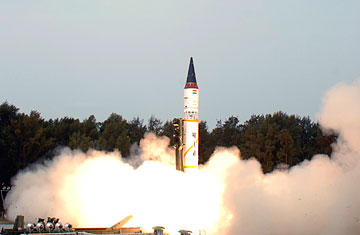
India's nuclear-capable Agni-III missile takes off in its third flight launch system in eastern India in May 2008
After over three years of laborious negotiations and much political muscle flexing at home and abroad, the Indo-U.S. nuclear deal cleared its final hurdle today, with the U.S. Senate voting to ratify it 86-13. But the approval came as a bit of an anti-climax for both administrations, with Washington and New Delhi preoccupied with other more pressing issues — Washington with the economy, New Delhi with a recent string of domestic security failures that have led to nearly a dozen terror strikes across the country in the last four weeks. When both administrations go to the electorate — India is getting ready for general elections too, though not sooner than early next year — the long-awaited nuclear deal may not be the biggest trumpet they blow.
Yet the significance of the deal, known as the 123 Agreement, cannot be overestimated. In addition to reversing 34 years of U.S. policy opposing nuclear cooperation with India — a nuclear weapons state that continues to refuse to sign the 1968 Nuclear Non-Proliferation Treaty — the deal wins acceptance for India's de facto nuclear weapons state status at the Nuclear Suppliers Group, the international cartel that controls trade in nuclear weapons, fuel and technology. That recognition will finally allow India to take part in international nuclear commerce and its scientists to participate in international nuclear research activities. For India, the approval is a ringing endorsement of its increasing weight in international affairs, and an acknowledgement of its growing intimacy with the worlds only remaining superpower. The bargain also clears the way for American and European nuclear corporations to bid for contracts worth $27 billion to build 18-20 nuclear reactors in India. And though its high cost and the enduring controversy surrounding it may mean that nuclear energy never comprises more than 7% of India's nuclear mix, it will go a long way to fill the growing economy's yawning energy deficit.
Still, some apprehension over the details of the legislation remains, especially in India where some pundits believe the U.S. has retracted its earlier assurances that it would help India access technology to reprocess spent fuel and build a stockpile of nuclear material to tide over any potential supply disruptions. President Bush's recent statement in which he said his administration has made a "political" but not "legally-binding" commitment to assure fuel supply to India has upset many. Others, however, point out that assured fuel supply depends on India sticking to the commitments it has made to the International Atomic Energy Agency (with which it has signed a 'safeguards agreement' opening its civilian nuclear reactors to IAEA inspections), the NSG and to the U.S. with regard to non-proliferation and not testing another nuclear weapon. India, with its clean non-proliferation record and unilateral moratorium on testing, has nothing to fear, they stress." In fact, non-proliferationists in the U.S. and at the NSG are still dismayed that the deal does not dissuade India strongly enough from testing another nuclear devise. Yet, even among the deal's supporters, the clear sense of triumph is accompanied by questions. "The 123 Agreement is the best deal we could have had with the U.S.," says Lalit Mansingh, a former ambassador of India to Washington, adding that a recent statement by President George W. Bush has raised concerns over whether some provisions of critical importance to India — particularly those pertaining to fuel assurances — are legally binding or are merely "political commitments." Says Mansingh, "We will have to wait to see the Presidential note when President Bush signs the bill."
But one thing India does not doubt is that the 123 Agreement will transform the way the country is viewed in the eyes of world. According to strategic affairs analyst Manoj Joshi, without access to international nuclear trade, India "could boast of our bomb, our BPO prowess, economic growth, invites to the G-8 meetings and candidacy for the UN Security Council seat But we were firmly at a different level from, say, China. They could import powerful computers, uranium, sensitive machine tools, software and components for satellites that were denied to us." Today, that changed, as did the international community's policy of equating India and Pakistan as nuclear weapons states. As Indian and U.S. officials have repeatedly pointed out, the deal has "de-hyphenated" India from Pakistan. "For decades India has chafed at the world's tendency to lock India into a bipolar South Asian framework with Pakistan," says Joshi. "Now, decisively, the rules have been changed for India, and pointedly not for Pakistan." The deal also has a bearing on the regional balance of power, making clear the U.S.'s proclivity to India and sending a signal to Beijing that it has other options in the Asian region. p>
On a slower news day, the deal might have gotten more fanfare. But in Washington, immediately after voting, the Senate went back to deliberating the financial bailout package. The Bush administration had achieved one of its most important foreign affairs successes, but there was more pressing business to be sorted out at home. Secretary of State Condoleezza Rice is expected in India later this week to ink the agreement with Indian External Affairs Minister Pranab Mukherjee. In India, news channels interspersed images from the deal being passed with footage of Oct. 2 bomb blasts in the northeastern state of Tripura. Neither of the governments that led these historic efforts will benefit from it today. But for both, the deal will be a significant and unprecedented legacy.
